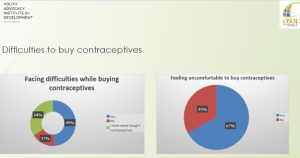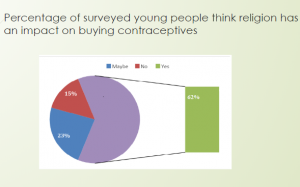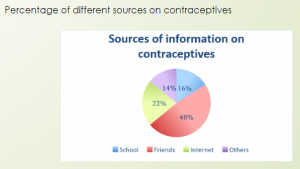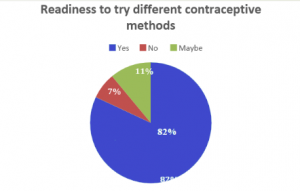Yes We CAN!
As you all know ASAP is now 10 years old and in this short journey of knowing and working closely with some of the brightest and most passionate advocates of reproductive rights across Asia, we have been able to channel our ideologies of equal rights into reality by mobilizing and working together in the form of our amazing County Advocacy Networks (CANs).
With this new series of blogs we want to share with all of you, some of the work that our CANs have been carrying out in their respective countries. Every week we’ll be posting some glimpses into their work like the research, data collection, stories along with the steps taken by each of these groups that have helped the #srhr needs of their regions, directly or indirectly.
Youth Advocacy Institute for Development- BANGLADESH (YouthAID-B)
Based on a presentation by Co-Founder and Youth Champion Anike Binte Habib
Access to Contraception among educated urban youth
Study Background
Bangladesh has an adolescent population of approximately 36 million (BBS, 2015). Which is, one third of the country’s total population. However, this young mass faces a number of issues such as early marriage, high fertility, limited negotiation skills, and insufficient awareness of and information about reproductive health. More specifically, the young people are poorly informed about contraception which translates into almost one-third of adolescent girls begin childbearing between the ages of 15-19 years. In another study, it was found that 20% of married adolescents without children were using contraception, compared to 42% among all adolescents. Young girls enter married life without proper knowledge with limited ability to exercise their reproductive rights, including
- decisions related to family planning,
- childbearing and maternal and
- child health services, and usually begin childbearing soon after marriage.
Therefore this study by YouthAID-B attempts to contribute to add knowledge on situation, perception and policy option required in this field and to assess the educated urban youth’s access to contraception in Dhaka, Bangladesh

The surveyed young people are age between 19-25 years where 53.1% are female and the remaining (46.9%) are male. 78.9% are the students and 21.1% are service holders. 26% of those surveyed were married, 44% were single and 30% in a relationship. 82.1% said that they were sexually active and 17.9 reported the opposite
Analyses
Shared below are just some of the interesting findings of the survey conducted by YouthAID-B
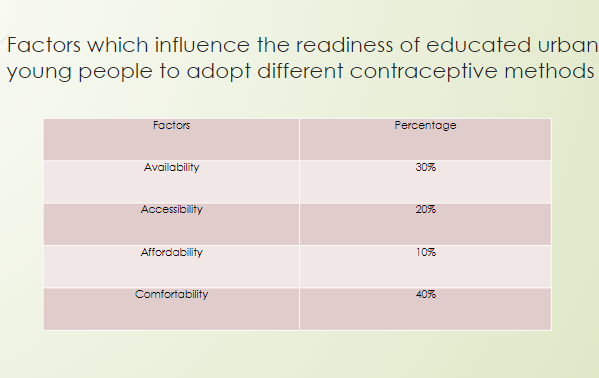
Most of the people surveyed had a lot more to say:
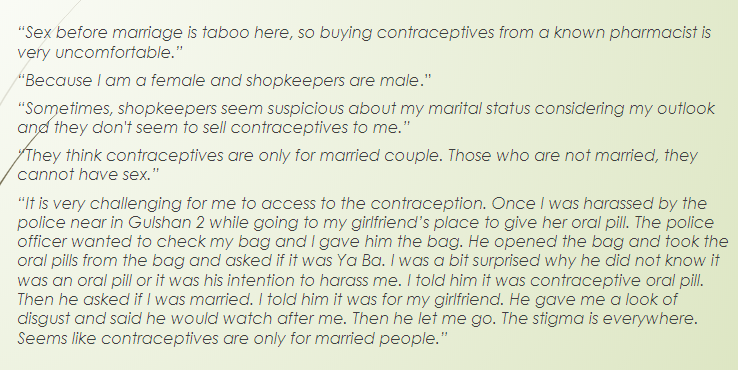
So what does all this really mean?
An obvious understanding that came out was that indeed ‘Socio-cultural factors hinder accessing to the contraception use among urban educated young people’. Social norms, stigma, taboo, religious norms and patriarchal structure of the society hinder accessing to contraception use among urban educated young people. What was also evident was that there clearly is an unmet need of contraceptive methods among educated urban youth’. The study shows, that one of the biggest factors to blame here can be lack of availability and accessibility of both the information and the service for long-term and short-term contraceptive methods. Also a popular opinion was that ‘If the right information is available and young people are aware of the different contraceptive methods then they might even try them. The study also shows that if young people have right knowledge and are aware of the different contraceptive methods, and if these methods are available, accessible, affordable and comfortable, then they will try using these.
What YouthAID-B believes
National adolescent health strategy needs to be revised along with young SRHR practitioners in terms of promoting contraceptive methods. The strategy must include directions on providing a range of good quality male and female contraceptive methods which are available, affordable and accessible for both young married and unmarried men and women.
Knowledge, information and counselling on contraceptive methods should be accessible for both young men and women and promoted by the Government. There should be centres for young men and women where they can get information on contraceptive methods. Government in association with NGOs and CSOs can initiate a national awareness campaign under the family planning programme to dismantle the myths related to contraceptive methods and hammer the socio-cultural barriers that create hurdle for urban young people accessing to the contraception.

